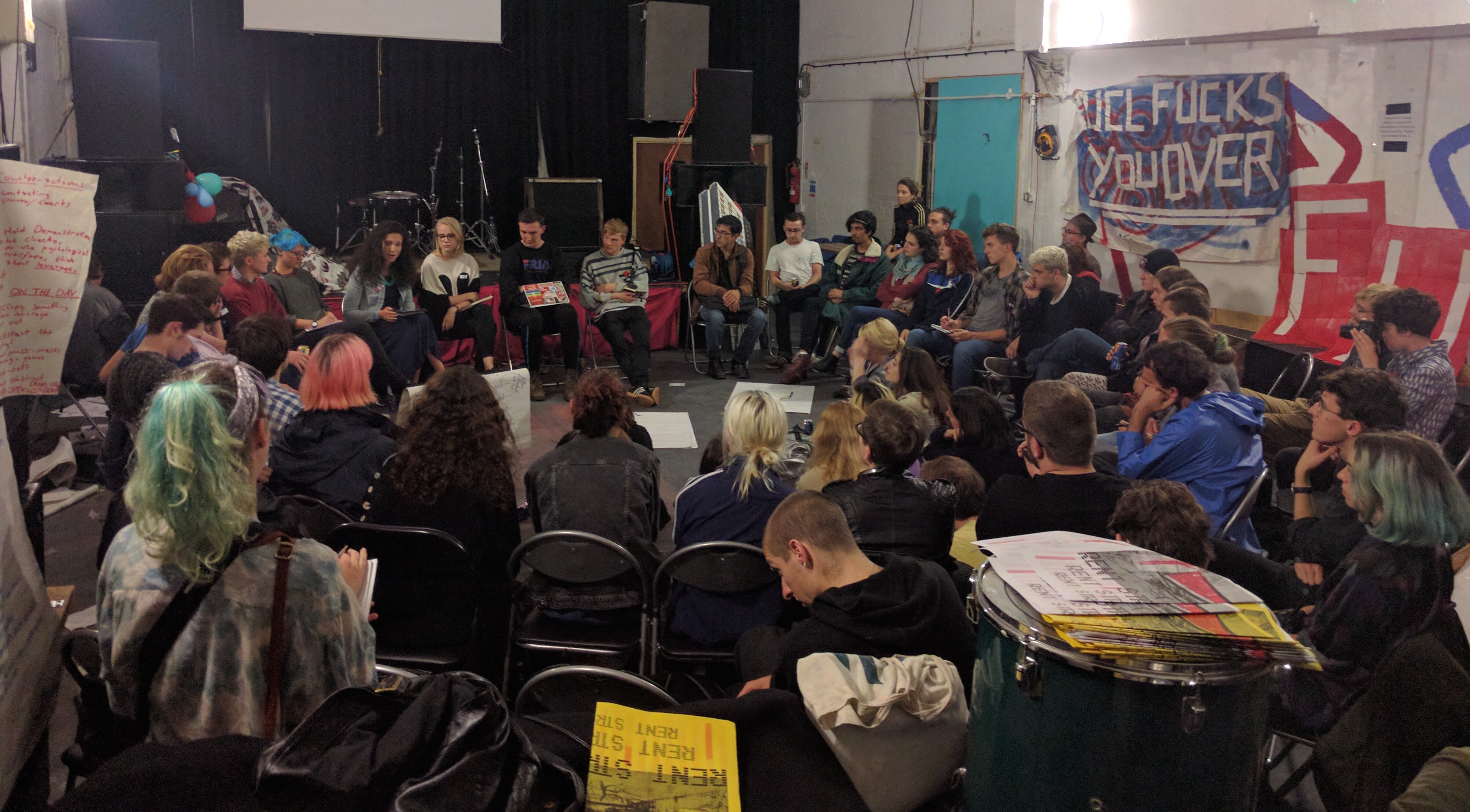Rent Strike Weekender: Why Students Must Fight Unaffordable Housing Collectively
by Anabel Bennett
7 October 2016

In late August at a National Union of Students press conference, it was announced that the NUS will be actively supporting a wave of student rent strikes across the country. This move represents a change in tack from the NUS leadership, signaling potential mobilisation around resisting evictions and providing legal assistance to strikers. This could facilitate bigger rent strikes than ever before, which could subsequently lead to greater victories. Rent strikers will collectively have greater bargaining power and support.
The spread of the rent strike is well underway. In mid September, the Rent Strike Working Group, supported by Plan C London, the NUS, and the Radical Housing Network, hosted a ‘rent strike weekender’. This was an ambitious attempt to bring people together from all over the country to meet, share experiences, and ultimately build connections that will form the basis of a national movement. The event exceeded the organisers’ expectations: over 160 students and activists attended, and about 25 campuses in the UK and abroad were represented.
The university is a debt factory.
Campaign demands may differ across campuses – a rent strike is ultimately just a tactic – but each rent strike will be working to achieve similar goals: to bring an end to student accommodation putting students further into debt. A recent report by the NUS, aptly named Double Jeopardy, revealed that of the new £9k fee-paying cohort, 47% moved back into their family home after graduation. An increasing number of graduates simply can’t afford to live independently.
Throughout the year, UCL Cut the Rent received dozens of messages from students struggling with rent, uncooperative accommodation staff, and collapsing ceilings. One aim of the weekender was to form a support network that is so desperately needed for students in insecure, unaffordable housing. In addition, an NUS study this year found the majority of students will experience mental health problems at university – this is a crisis threatening the wellbeing of all students.
Solidarity networks.
The weekender also featured a workshop called ‘Striking at the Intersections’, which focused on organising our campaigns in a way that is intersectional, prioritising the needs of the most vulnerable rent strikers, such as international and working class students. The weekender also held the first ever rent strike women and non-binary caucus.
The aim of these sessions was to stress that inclusion of all identities and oppressed groups is a fundamental component of any successful rent strike movement. We can never expect to be perfect, but minimising the oppressions in our own spaces is something we should always be struggling to achieve.
Widespread rent strikes in student halls have the potential to socialise our struggles. We are accustomed to difficulty with paying rent being individualized: struggling to keep up with rent, or to afford basic living costs, is attributed to one’s own failure. It was frustrated students realising they were the majority that eventually led to the success of the UCL rent strike. We were finding a collective solution to a collective problem.
Beyond London.
Students are struggling against extortionate rent prices all over the country. One of the aims of the weekender was to shift the focus away from London-based Russell Group universities in order to build a national housing movement providing solidarity and practical support. The idea that hundreds of students from across the country could congregate at short notice to resist evictions could soon become a reality.
We can’t afford to be London-centric when every year an increasing number of British cities are becoming unaffordable, rents for student accommodation are set significantly higher than the local average, and even average rents are being pushed up in university towns – an effect described as ‘studentification’. An activist from Durham Left Activists confirms this is part of what is happening in Durham: “The divide between students and locals is noticeable, […] having the university as the largest landlord by a mile means that the knock-on effect [on rent prices] is immediate and noticeable.”
Richard, also from Durham Left Activists, commented: “The amount of money that Durham [University] was charging was extortionate, especially considering that County Durham is the cheapest area in the UK for housing. […] Spiraling rents hurt everyone, and only benefit the university.”
In this context, it makes sense that Cut the Rent groups and similar campaigns have been springing up on campuses all over the UK.
“It’s really important that renters in London, Bristol and everywhere else too connect up, as it’s the same struggle everywhere”, said a campaigner from Bristol Cut the Rent. “Housing is the number one issue in Bristol […] so we decided to do something about it.”
Each Cut the Rent group will be different: we create the kind of organising structure we want to see. What this weekender sought to do was facilitate the creation of spaces all over the country where students can organise, discuss, and support each other.
But why was the weekender called a ‘weekender’, and not a conference?
The reason behind this is simple. Being a student can be pretty depressing. Being a student whilst dealing with the additional physical and emotional labour of running a small, under-resourced campaign is often more depressing. We want to forge networks of friendship and solidarity between students, because the potential of what we could achieve collectively is massive.